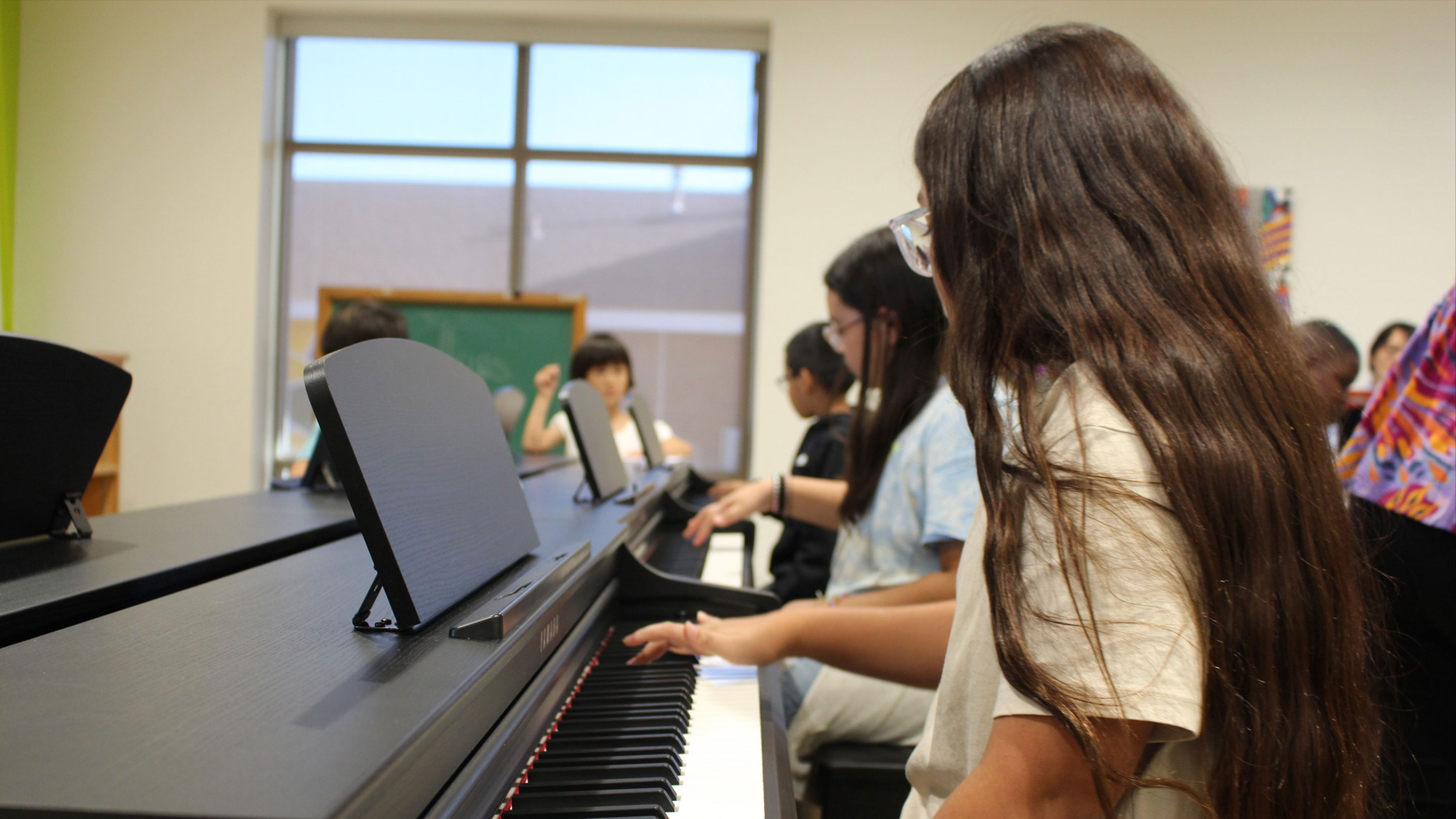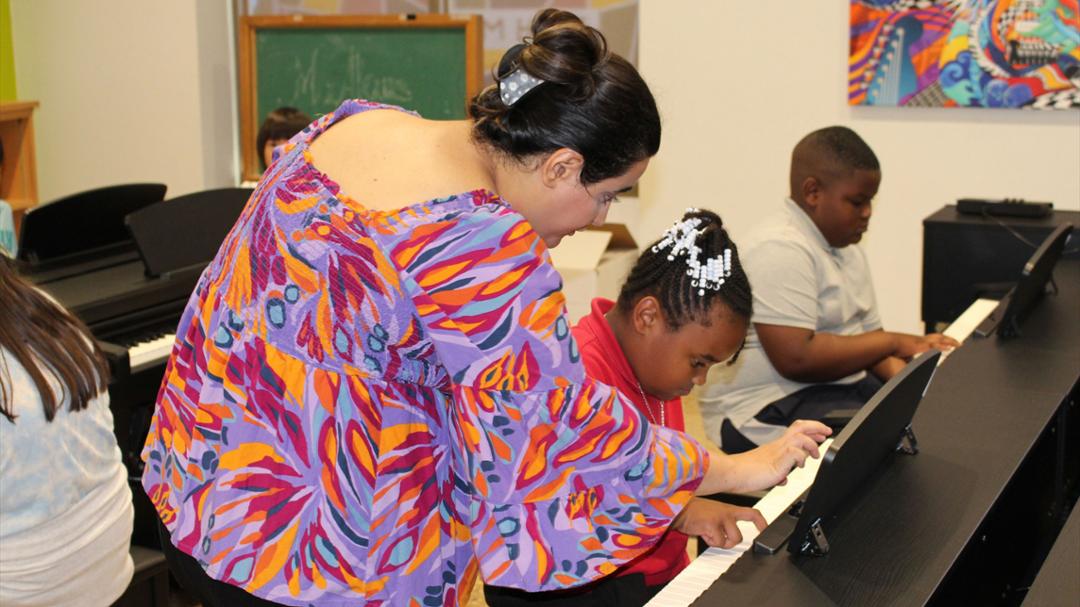Children in the Lubbock community are learning piano due to a partnership between J.T. & Margaret Talkington College of Visual & Performing Arts and Guadalupe-Parkway Neighborhood Centers
Gabby Wallace steps out into the fall breeze and climbs aboard her school bus. The 9-year-old makes her way to the Guadalupe-Parkway Neighborhood Centers in East Lubbock where she’ll spend two hours before going home.
But this is not just any afterschool program. It’s not childcare. The center offers creative programming from art to music and dance, etiquette and swimming lessons, and even college prep. Guadalupe-Parkway Neighborhood Centers is a hub for education and new experiences.
The latest experience being piano classes.

The partnership between Texas Tech University's J.T. & Margaret Talkington College of Visual & Performing Arts (TCVPA) and the Guadalupe-Parkway Neighborhood Centers launched in fall 2023, when children at the center began taking piano lessons in a new lab furnished with 15 Yamaha keyboards. The School of Music also provided teachers for the classes.
Graduate students come to the center on Tuesdays and Thursdays, bringing quality teaching to the children.
In addition to these resources provided by TCVPA, the program is currently funded in part through the generosity of The CH Foundation and Helen Jones Foundation, as well as by supporters of both TCVPA and the Guadalupe-Parkway Neighborhood Centers.
Gabby is in the second piano class, made up of older elementary school students. The other class has a mixture of 6- and 7-year-olds.
Gabby tosses her braid behind her shoulder and rests her fingers on the black and white keys. Along with the other students, she places headphones over her ears and listens to the excerpt the teacher is playing today.
The keyboards are digital, making it possible for students to practice individually and the instructor to listen one–on–one.
“When I get sad or mad, piano helps me feel happy,” Gabby said.
The fourth grader says when anxiety gets the best of her, she looks forward to music classes in the afternoon and it calms her down.
Gabby is one of a few dozen students who benefit from the new keyboards. But the benefits are not purely emotional.
“Research shows us that playing an instrument boosts cognitive ability,” said Leobardo Guerrero, coordinator of group piano at Texas Tech. “Playing piano engages both sides of the brain, forming new neuropathways. This helps students with memorization, vocabulary, mathematics and so on.”
Guerrero has been an integral part of getting the piano lessons going. In addition to teaching group piano, he also collaborates with piano programs in the community on behalf of Texas Tech.
Working with the children at the center reminds Guerrero of his own childhood.
“I grew up in Mexico City and had no access to anything like this,” he said. “I learned guitar because that was what was available, but I didn’t get the chance to study piano until I was in university.”
Incredibly, Guerrero caught up and still made a career out of it.
“But I do wonder what my career might have been like had I started at this age,” he said as he motioned to the first graders.
Dela Esqueda stands at the glass windows in the hallway looking into the piano lab. The executive director of the center is dressed in a black pantsuit with a flash of red at the collar.
Texas Tech colors.
A proud Texas Tech alumna, her university connections are what got her into this job.
“I worked in the penal system for many years before coming here,” she said. “I met many young men and women who had made bad choices, often because they lacked guidance when they were younger.”
These stories took a toll on Esqueda over time.
One day, another Texas Tech alumnus called up Esqueda and told her she needed to see the Guadalupe-Parkway Neighborhood Centers. She didn’t know at the time, but he was actively recruiting her as the center’s next director.
“It was appealing to me to work with children in a preventative way,” Esqueda recalled. “If children had a place where they could feel safe and loved and learn creative skills, maybe their outcome would be different.”
Esqueda took the job and has been there 19 years.
Earlier this year, one of the center’s board members told Esqueda they were meeting with Martin Camacho, dean of TCVPA. They asked for some brochures to take to him, knowing of his passion for programs like this one.
“I immediately saw the potential of a partnership between Guadalupe-Parkway Neighborhood Centers and TCVPA and knew we could create an impact,” Camacho said. “I truly believe in sharing the knowledge of the arts that exists at Texas Tech with the community, in creating space where college students can begin to experience the transformative power of the arts with children throughout Lubbock.”
The board member came away with a promise from Camacho. He would come visit the center.
Camacho was as good as his word. He came out shortly after and knew the college could invest in the center.
“Without the help of Texas Tech and Dean Camacho, we wouldn’t be able to do this,” Esqueda said, as she looks across the line of keyboards awaiting the arrival of their musicians.
It’s a special moment each day when the kids slide onto the piano benches and take a deep sigh, leaving the stress of the school day behind.
A few weeks ago, Gabby realized just how grateful she was for the pianos.
“I had a hard day at school because some of the other kids were being mean to me,” she said. “This made me sad and by the time I got to the Guadalupe-Parkway Neighborhood Centers I went to the bathroom and cried.”
As Gabby was gathering herself, she heard a familiar sound from across the hall. Students were warming up on the keyboards and the sound of music filled her ears.
“I walked in and started playing and my whole day got better,” she said, a big grin on her face.
No matter what is happening in a student’s life, when they enter the piano lab, they regain a small sense of control. Each key provides a constant, each song provides a sense of accomplishment.
“These children do not forget who loved them,” Esqueda said. “Sometimes that love is demonstrated by what you invest in them.”

